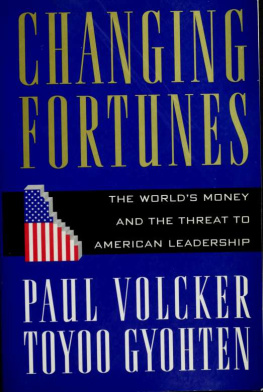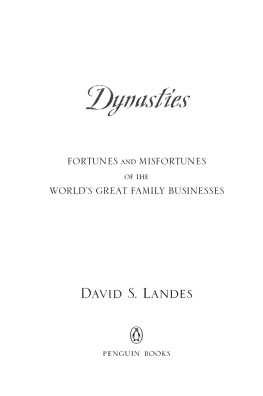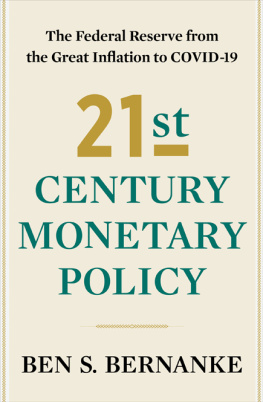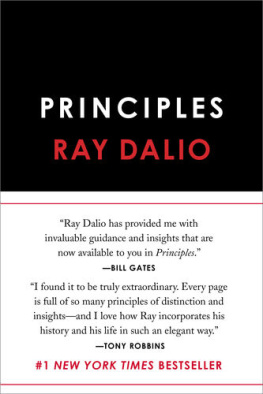This book made available by the Internet Archive.
FDITOR'S BOTE
1 have spent a lifetime as a journalist observing many of the events in this book, and it has been an illumination for me to hear them described from the inside by two of the men who made them. Nothing quite like it exists anywhere else: the distinct voices of two successful economic statesmen reviewing their often tumultuous careers, justifiably proud of their achievements but admitting with refreshing candor that they were sometimes surprised by events and the results of their own policies, and that they might have done things differently, or even better. Their book should be read as a counterpoint between established and rising powers by two men who held similar positions on different, although not necessarily opposing, sides. In the current heated climate it also shows the value of civilized conversation between the United States and Japan.
Both authors count Princeton as their alma mater, but with quite different experiences. Paul Volcker was at Princeton as an undergraduate right after World War II, and about a decade later Toyoo Gyohten was the first of a long series of young staff members at the Japanese Ministry of Finance who completed their graduate education at the Woodrow Wilson School. They first met when Gyohten was special assistant to the Japanese minister of finance during the difficult and rancorous negotiations leading to the Smithsonian agreement. Their responsibilities continued to intersect as Gyohten rose through the ranks of the ministry, eventually becoming vice minister for international affairs in 1986.
EDITOR S NOTE
Although Volcker entered investment banking after retiring as chairman of the Federal Reserve Board in 1987, he spends part of each year teaching at the Woodrow Wilson School. Gyohten spent a year in residence there after retiring from government service, and thus they collaborated on a seminar, passing on some of the lessons of their lives in public service.
Everything here is the authors' own in a framework of their own devising, fortified by their frank and considerate responses to their students, who were often their most pungent questioners. A remarkable team of young research scholars at Princeton has also provided a chronology, glossary, bibliography, and some worthwhile charts and statistics, which all those involved in this project hope will support their principal aim: to raise public consciousness and make the book a standard in a field that is too important to remain the arcane property of economists.
Lawrence Malkin
AUTHORS* MOTt
1 his book grew, rather spontaneously, out of a series of informal lectures at the Woodrow Wilson School at Princeton University, which is first of all a place for learning about the arts of government and public policy. To that end, its faculty is replete with distinguished economists, political scientists, sociologists, scientists, and demographers. But the educational effort, if it is to be successful at all, has to be more than the sum of those individual parts. It has to capture something of the way in which a combination of the school's disciplines can be brought to bear in dealing with complex issues of national and international policy. And something more is at stake. Talented young people need some sense of the challenge and excitement that work in government can bring to them. Only that can encourage them to commit a large part of their working lives to public service.
To further those aims we were asked, as practitioners in world financial affairs throughout our careers, to conduct a joint seminar during the spring of 1991 on developments in international monetary affairs over the past half century.
One or the other of usand usually bothpersonally participated in most of the events we describe. Our vantage points and, as it sometimes turned out, our understandings were quite different. Our reflections illustrate how different national points of view, intellectual backgrounds, and political and bureaucratic constraints influence events and complicate negotiations.
AUTHORS NOTE
For all of that, what may be more striking are our fundamental areas of agreement as we review the management and the decline of the Bretton Woods system of fixed exchange rates, the great oil shocks of the 1970s, the effort to come to grips with inflation, the international debt crisis in the 1980s, and the renewed attempts at the Plaza and the Louvre to deal with the instability of exchange rates.
What this experience suggests for the evolution of the world monetary system we leave to our ruminations in the final chapter. What we do feel confident about is that the firsthand experience of those of us who are familiar with the challenges, the paradoxes and dilemmas, the achievements and the failures of the system in the past are not irrelevant for the future. That is why we have turned our experience into a book.
Mechanically, this book took form from the transcription of seminars at the Woodrow Wilson School. But those bare mechanics required a great deal of creative human intervention, accompanied at times by almost inhuman patience on the part of our collaborators.
We were indeed fortunate in the choice of Lawrence Malkin as editor. To say he clarified language, rearranged passages, eliminated redundancies (at least some of them), asked the right questions, and proposed relevant additions is all accurate. It is also inadequate. The simple fact is there would be no book without his enthusiasm for the project, without his insistence that it was all worthwhile, and without his production of an edited draft of the transcripts from which we could work. We have long been aware of him as a first-rate professional reporting and writing in the field of economics and international finance. We now proudly count him as a friend and colleague.
Our seminar lectures were chaired with cool efficiency by Atish Ghosh of the Princeton economics faculty, who saw to it that we addressed relevant questions and that our students actually learned something useful. Throughout the preparations for the lectures, we were also assisted by three exceptionally able Princeton graduate students. William Grimes and Daniel Granirer are young North American political scientists with an intense interest in the growing role of Japan in world affairs; both are fluent in Japanese and the field of political economy. Rami Amir brought his interest in economic policy and research training to the job of tracking down some elusive facts and preparing statistical materials. Michael and Elizabeth Friedberg were diligent in transcribing tape recordings into coherent typescripts quickly and efficiently.
Marianne Donath, our secretary at Princeton, did an amazing job of
vin
AUTHORS NOTE
translating the unintelligible into a readable draft. Michael Bradfield, Sam Cross, Robert Solomon, and Edwin Truman, all of them old colleagues at the Federal Reserve, volunteered to read parts of the draft and to run down some facts to make sure our memories were anchored in reality. Anke Dening in New York cheerfully coordinated much of the work flow while prodding one of the authors to get it all done.













